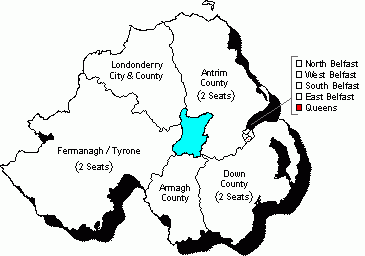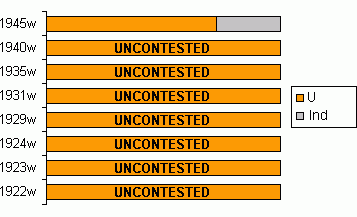

 |

|
| |
| |

|

|
| Map and diagram by Conal Kelly | |
As part of the 1917 Redistribution of Seats (Ireland) Act, Queens University Belfast was enfranchised as a new non-territorial Parliamentary constituency. The electorate included all male graduates 21 years of age and older and all female graduates 30 years of age and older. Most of this electorate was made up of plural voters, in that many could also vote in a territorial constituency. Unlike the rest of Westminster seats in Northern Ireland, beginning in 1922 the Queen University constituency used the Single Transferable Vote (STV) method of Proportional Representation (PR). Between 1922 and 1949 the constituency was represented by just three MPs, all of whom were Unionists. The longest serving of these was Col. Thomas Sinclair, who was first elected in 1923 and continued to represent the constituency until his resignation in 1940. With the exception of 1945, all elections during this period went uncontested. The declared winner in each case was the sole Unionist nominee.
| U | Ind | |
| 1945w | 72.5% | 27.46% |
| 1940w-b | * | |
| 1935w | * | |
| 1931w | * | |
| 1929w | * | |
| 1924w | * | |
| 1923w | * | |
| 1922w | * |
* The only candidate nominated for the 1922 General Elections was Unionist Sir William Whitla. The only candidate nominated for the 1923, 1924, 1929, 1931, and 1935 General Elections was Unionist Col. Thomas Sinclair. The only candidate nominated for the 1940 By-Election was Unionist Prof. Douglas Lloyd Savory. In each instance the sole candidate was therefore duly elected without a contest.
Unionist majority: 1,195; electorate: 5,134; votes cast: 51.6%
For the first
time since 1918, there would be an actual electoral contest for the
Queens University seat in 1945. The incumbent, Prof. Douglas Savory,
would again represent the Unionist Party. His opposition would come
in the form of Independent candidate, Thomas Cusack. In the end,
Cusack only managed to gather some 27% of the vote and Savory was
comfortably returned with a majority just under 1,200.
Savory would go on to hold the Queen's University seat until its
abolition in 1950. He would then switch seats to the newly established
South Antrim,
which he held until 1955.
Unopposed Unionist Candidate.
Following the retirement
of Sinclair in September 1940, a by-election was held the following November.
Prof. Douglas Savory was selected as the Unionist Party candidate. As so often
was the case in Queens University, there was no other nominee and Savory was
duly elected unopposed.
Savory was Professor of French and Roman Philology at Queen's University and
later became Professor Emeritus.
Unopposed Unionist Candidate.
Standing for his
final election in 1935, Sinclair remained unchallenged and was duly
returned once again. Sinclair would go on to resign his seat in 1940,
having represented the constituency for almost 17 years without ever
facing an actual electoral contest.
Sinclair would serve as Deputy Speaker of the Northern Ireland Senate
between 1935 and 1937.
Unopposed Unionist Candidate.
As was the evolving custom, there was just one candidate for the Queens University seat in 1931. The Unionist Party's Sinclair was returned unopposed for the fourth time.
Unopposed Unionist Candidate.
As was the case for the previous three elections, the incumbent did not face any opposition again in 1929. Sinclair was duly elected without a contest once more. Queens was one of three seats that went uncontested across Northern Ireland in the 1929 election.
Unopposed Unionist Candidate.
In the third election in as many years, Sinclair was the sole candidate nominated for Queens University in 1924 and was once again duly elected without a contest. Queens was one of only three seats that went uncontested in the 1924 general election.
Unopposed Unionist Candidate.
Following Whitla's
retirement, Col. Thomas Sinclair was selected by the Unionist Party to
defend the Queens University seat. As was the case in 1922, there were
no other nominees and Sinclair was duly elected unopposed.
Sinclair had been previously elected to the Northern Ireland Senate in
1921.
Unopposed Unionist Candidate.
Following the establishment of the Queens University constituency in 1918, Whitla had been elected as its first MP. In 1922 he was again put forward as the Unionist Party candidate. However, unlike his first outing, he would not face any opposition and was duly elected without a contest. Queens was one of ten seats to go unchallenged in 1922 and as was the case here, the Unionist Party candidate was elected in each instance.
See also:
Results from 1922 to 1949 for each seat: East Belfast | North Belfast | South Belfast | West Belfast | Antrim | Armagh | Down | Fermanagh and Tyrone | Londonderry | Queens University
Other sites based at ARK: ORB (Online Research Bank) | CAIN (Conflict Archive on the INternet) | Northern Ireland Life and Times Survey
Your comments, please! Send an email to me at nicholas.whyte@gmail.com.
Conal Kelly, 10 October 2007.
|
Disclaimer:©
Nicholas Whyte 1998-2004 Last Updated on Wednesday, 12-Jan-2005 12:12
|